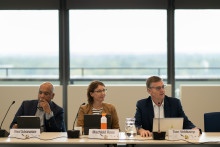Is there or is there not a vacancy stop now? The Executive Board, at least, strenuously denies it.
'I can confirm that: there is no vacancy stop. It's not that we deal with vacancies completely differently than before, it's that we now consider more strictly and in a more extensive discussion whether it is necessary to post a vacancy or not. In doing so, it is important to distinguish clearly where the funding comes from. For funding from the second and third money streams - research and project funding - nothing at all has changed since the austerity announcements. That will continue as normal.
For funding from the first money stream - directly from the ministry - it is different. Previously, it was up to a unit to weigh up whether to post a vacancy. Now, in support service departments it is the case that the Executive Board has to approve it, in faculties it is up to the Faculty Board to do so.'
What about temporary contracts? Do people still have the prospect of a permanent contract?
'Exactly the same as for vacancies, here too the final approval lies with the Executive Board or Faculty Board. They decide whether a temporary contract is converted into a permanent one. If you are in a vital position and you perform well, you don't have to worry too much. Then your temporary contract will simply be converted into permanent employment. Actually, not a whole lot has changed.'
What defines 'vital' in this case?
'Here, the main question is whether there are enough people to perform certain tasks within a unit or whether specific expertise is required, which cannot or cannot easily be taken over by others. We are struggling with declining student numbers. This while our costs are increasing across the board, not just in terms of personnel costs. Since we are shrinking in the first money stream and also have fewer students to serve, it makes sense that our staffing levels shift accordingly.'
According to this year's budget, the UT has to shrink by about 80 FTE by 2024, apparently only in support staff. Is that realistic with the measures currently in place?
'With tighter consideration of vacancies and taking natural attrition into account, that should certainly be achievable.'
Have the concerns of people on temporary contracts reached you and your department?
'Certainly, we sense uncertainty among people. That is obvious and, above all, incredibly bothersome for these colleagues. However, the financial situation is forcing us to cut our coat according to our cloth, which applies to the entire higher education sector. At around 70 percent, one of the biggest cost items is staff; our colleagues are our capital. Unfortunately, the cuts are going to hit people whose contracts are not renewed.'
Will these people receive support?
'There is infrastructure available and we have also communicated it in the HR column. Where possible, we try to point people to other job opportunities.'
In view of the internationalisation debate and political uncertainty, what are the prospects after 2024?
'I don't expect us to be able to let go of the current measures any time soon. There is a lot of political uncertainty - and that is absolutely frustrating. We simply don't know what a new cabinet will come up with. What we do know is that we have our work cut out for us to stay financially sound.'
Finally, are these developments affecting how attractive UT is as an employer? Don't the budget cuts and the internationalisation debate scare off talent?
'We are and remain an attractive employer, both because of the nature of the work and what we have to offer people. What does play is that the perception is adjusted from the political arena, that is what we are struggling with as a whole higher education sector within the Netherlands. That will not help to attract international talent. But it is up to us to show that we are still a good and attractive employer.'






